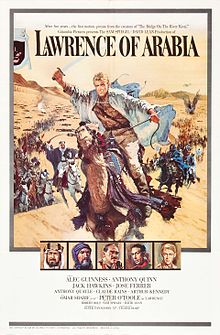Our website is made possible by displaying online advertisements to our visitors.
Please consider supporting us by disabling your ad blocker.
Lawrence of Arabia (film)
| Lawrence of Arabia | |
|---|---|
 Theatrical release poster by Howard Terpning | |
| Directed by | David Lean |
| Screenplay by | |
| Based on | Seven Pillars of Wisdom by T. E. Lawrence |
| Produced by | Sam Spiegel |
| Starring | |
| Cinematography | Freddie A. Young |
| Edited by | Anne V. Coates |
| Music by | Maurice Jarre |
Production company | |
| Distributed by | Columbia Pictures[1] |
Release date |
|
Running time | 210 minutes[2] |
| Countries | United Kingdom[3] United States[4] |
| Language | English |
| Budget | $15 million[5] |
| Box office | $70 million[5] |
Lawrence of Arabia is a 1962 epic biographical adventure drama film based on the life of T. E. Lawrence and his 1926 book Seven Pillars of Wisdom (also known as Revolt in the Desert[6]). It was directed by David Lean and produced by Sam Spiegel through his British company Horizon Pictures and distributed by Columbia Pictures. The film stars Peter O'Toole as Lawrence with Alec Guinness playing Prince Faisal. The film also stars Jack Hawkins, Anthony Quinn, Omar Sharif, Anthony Quayle, Claude Rains and Arthur Kennedy. The screenplay was written by Robert Bolt and Michael Wilson.
The film depicts Lawrence's experiences in the Ottoman provinces of Hejaz and Greater Syria during the First World War, in particular his attacks on Aqaba and Damascus and his involvement in the Arab National Council. Its themes include Lawrence's emotional struggles with the violence inherent in war, his identity and his divided allegiance between his native Britain and his new-found comrades within the Arabian desert tribes.
The film was nominated for ten Oscars at the 35th Academy Awards in 1963, winning seven including Best Picture and Best Director. It also won the Golden Globe Award for Best Motion Picture – Drama and the BAFTA Awards for Best Film and Outstanding British Film. The dramatic score by Maurice Jarre and the Super Panavision 70 cinematography by Freddie Young also won praise from critics.
Lawrence of Arabia is widely regarded as one of the greatest films ever made. In 1991, it was deemed "culturally, historically, or aesthetically significant" by the United States Library of Congress and selected for preservation in the National Film Registry.[7][8] In 1998, the American Film Institute placed it fifth on their 100 Years...100 Movies list of the greatest American films and it ranked seventh on their 2007 updated list. In 1999, the British Film Institute named the film the third-greatest British film. In 2004, it was voted the best British film in The Sunday Telegraph poll of Britain's leading filmmakers.
- ^ a b "Lawrence of Arabia (1962)" Archived 27 March 2019 at the Wayback Machine, AFI Catalog.
- ^ "Lawrence of Arabia". British Board of Film Classification. Archived from the original on 8 October 2020. Retrieved 10 February 2023.
- ^ "Lawrence of Arabia (1962)". BFI. Archived from the original on 6 February 2016. Retrieved 30 October 2022.
- ^ Lawrence of Arabia, AFI Catalog American Film Institute. Retrieved 3 November 2023.
- ^ a b "Lawrence of Arabia". The Numbers. Archived from the original on 13 January 2015. Retrieved 13 January 2015.
- ^ Revolt in the Desert
- ^ "Complete National Film Registry Listing". Library of Congress. Archived from the original on 8 October 2020. Retrieved 8 October 2020.
- ^ Andrews, Robert M. (26 September 1991). "25 Classics Join U.S. Film Registry". Los Angeles Times. Archived from the original on 15 September 2015. Retrieved 4 September 2015.
Previous Page Next Page


